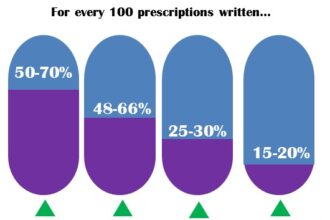Since 1960, American adults have, on average, gained 28 pounds. That’s the equivalent of a small child. In his new book, Heavy: The Surprising Reasons America Is the Land of the Free — and the Home of the Fat, Richard McKenzie details what he believes are the economic causes of this increase:
Since 1960, American adults have, on average, gained 28 pounds. That’s the equivalent of a small child. In his new book, Heavy: The Surprising Reasons America Is the Land of the Free — and the Home of the Fat, Richard McKenzie details what he believes are the economic causes of this increase:
- The growth in world trade freedom
- The downfall of communism
- The spread of free-market economics
- The rise of women’s liberation
- The long-term fall in real minimum wage
- The rise of competitive markets on a global scale
The rise of women’s lib? McKenzie claims this is because more women today work outside the home (60%, up from 33% in 1950), leaving them little time to prepare healthier meals for their families:
Instead of the chicken stewed all day on the stovetop, the family understandably opts more and more frequently for prepackaged frozen chicken fingers or chicken dinner at the nearby restaurant. Time and money may be saved, but not calories, as processed and prepackaged foods as well as restaurant menus tend to be more calories-rich than home-produced meals without processed ingredients.
In general, anything that increases economic well-being, according to McKenzie, makes us fat. While the standard of living increased over the past several decades, the price of food relative to other goods has fallen about 17%. Research has shown that for every 1% drop in the price of food, people increase food consumption by .6%. Food may become cheaper and more readily available, but our 20,000-year-old metabolisms don’t adjust for the added intake of calories.
McKenzie summarizes his theory in a short video here.







